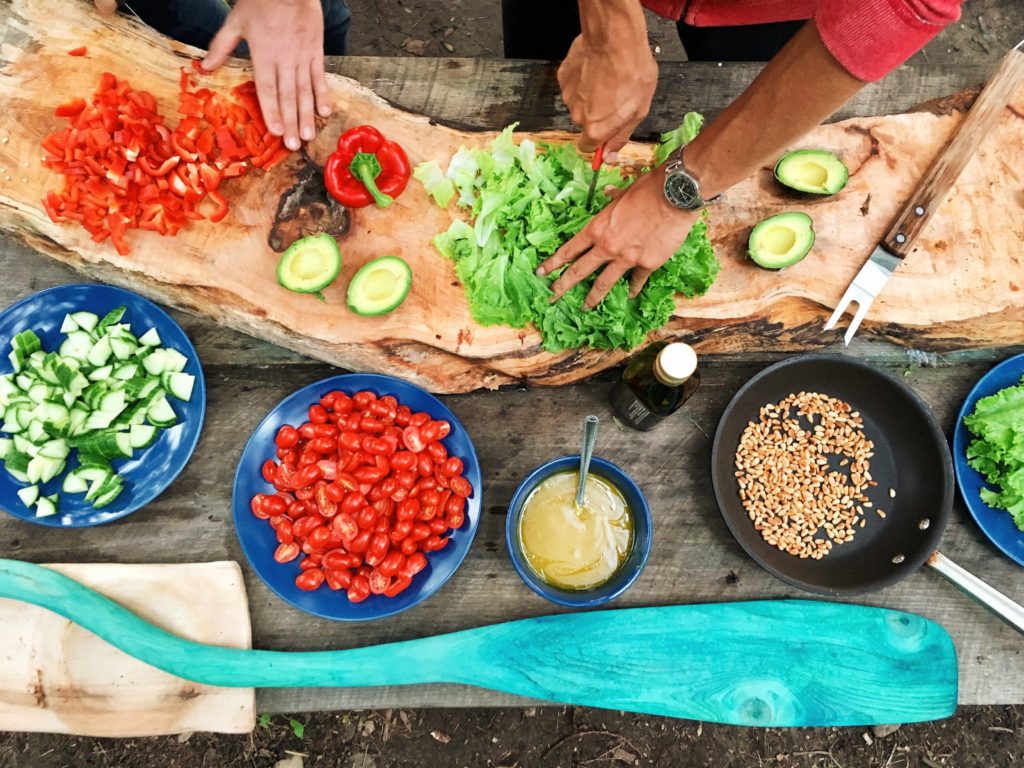
My younger brother recently moved away from home. Living so far from family and in a different time zone has been quite a learning experience for him. However, the most difficult aspect has been in the food department. He is an incredibly frugal person and doesn’t like to go out to eat, so he is trying to learn how to cook his own food; let’s just say, thus far it’s not working out particularly well for him.
After one week we laughed about an explosion of beans that blanketed every surface in his kitchen with mushed beans and an unfortunate incident with cheese and more ants than he has ever seen in his life. In spite of his struggles, I have encouraged him to keep trying and, after finally deciding to take my advice, he is beginning to have greater success.
When I moved into my first apartment away from home, I, too, struggled with what to make for dinner. And, in lieu of resigning myself to just eating out each night, I decided to learn how to cook.
1. Invest In The Right Tools
First and foremost you need the right tools. Ensure you have cutting boards, knives, wooden spoons, a spatula, at least one glass baking dish, plastic bowls for mixing, measuring cups, and the appropriate pots and pans. Early on I invested in the bare minimum tools and then as my cooking skills have increased, I’ve invested in even more items.
2. Invest in a cooking app or a cookbook so you have dishes to choose from
I also searched for a couple great cooking apps. My favorite is Yummly. The app allows you to search for recipes based upon diet and the food you have on hand (among other search filters) and it also has a good database of quick and easy meals.
If you are a bit more old school, you can also opt for a cookbook. As I’ve advanced in my cooking, I’ve actually acquired several really great cookbooks for specific fare or specific circumstances, such as French food or Instapot-focused recipes.
3. Follow the Recipe Exactly and Note What You Like
With my app (or cookbook) firmly in hand, I started by finding a dish I wanted to make. I would then proceed to follow the recipe step-by-step. I started off with easier meals, such as pasta dishes, and then moved up to more elaborate meals such as Cornish game hen. Before starting any recipe I would actually taste each individual spice before adding it to the recipe to help me get a sense of the various flavors that would go into the dish.
After making the recipe once, I would make a mental note of the aspects of the dish I liked and what I might improve upon next time. For example, I would think about what flavors seemed to go well, did the dish have too much liquid or was the meat too dry. With each meal I would build on my prior knowledge by changing one thing to suit my tastes. Pretty soon, I started to realize how different foods and flavors come together to make a dish.
One thing to note, if the recipe calls for you to do something and you’re not quite certain what that is, look it up. I sent my brother a recipe for a simple stuffed acorn squash and I told him to cut the squash in half and then poke the inside with a fork. He thought I meant he should poke the squash all the way through so in lieu of a gentle prick, all of the delicious juices that should have been absorbed into the flavor of the squash were leaking out of the bottom! Argh!
4. Meal Plan
I also, however, had another realization. While I was learning how to cook, I wasn’t exactly cooking intelligently. While I would think about what I wanted to cook, I usually didn’t put too much thought into it until I arrived at the market, which would often result in my buying more food for different meals than I could possibly eat in a week. So, I started meal planning. I wrote out what I planned to eat for each meal on each day and wrote out a shopping list based upon the appropriate portions. Most recipes aren’t made for one so it’s important to think about whether you need to cut a recipe in half or by 2/3rds. No longer did I buy a whole box of brown rice, instead I opted for the bulk bins, which allowed me to buy enough brown rice for the week. By prepping my meals for the week, I realized that I was making healthier meals, with better ingredients while also saving money and avoiding food waste.
5. Be Patient
Finally, you need to have patience and show yourself a little grace. The learning to cook journey will take time and you shouldn’t be afraid to experiment. There were many times the recipe didn’t come out how I expected and I was disappointed and even now when I whip up something more complex I’ll be left wondering where I went wrong. However, I keep trying.
Cookbook and Cooking App Recommendations
A list of the cooking apps and books that I have handy:
- Yummly (app)
- Allrecipes (app)
- The Essential Instant Pot Cookbook: Fresh and Foolproof Recipes for Your Electric Pressure Cooker by Coco Morante (book)
- Voilà!: The Effortless French Cookbook: Easy Recipes to Savor the Classic Tastes of France by Cecile Delarue (book)
- Glow: The Nutritional Approach to Naturally Gorgeous Skin by Nadia Neumann (book)